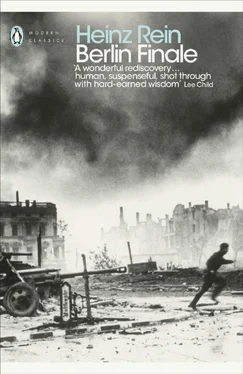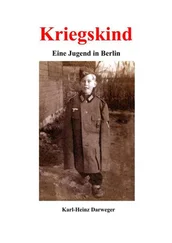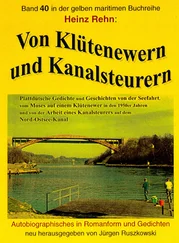In his restaurant Klose stands behind the bar waving his arms around. ‘Come on, come on, gentlemen,’ he calls, ‘That’s enough, there’ll be an air-raid warning in a minute, they’re already in Magdeburg, on their way to Brandenburg. So let’s get a move on, gentlemen.’
‘What’s on the way?’ one of the guests asks. ‘A small squadron?’
‘The usual,’ Klose replies. ‘Couple of dozen fast ones, the unit has turned off towards central Germany.’
‘Well thank God for that,’ the other man replies.
‘What are you thanking God for?’ Klose asks. ‘I expect you were thinking, let the bombs fall on everyone else’s heads, at least my precious life has been spared, isn’t that it?’
‘Charity begins at home,’ the other man insists.
‘Good national comrade you are,’ says Klose, ‘people like you will keep the Führer going.’
‘I’ve had it with national comrades, Klose,’ his interlocutor replies, ‘each man for himself, the National Socialist Volkswohlfahrt for all of us.’
‘Great flying weather,’ says another guest as he pays his bill.
‘Don’t talk rubbish, Krause,’ Klose replies, ‘it’s always flying weather for them, you should have worked that one out by now. They come in broad daylight and when the moon is shining, in rain and snow and the deepest night, no blade of grass, no Göring is a match for them, however many little girls he recruits for the army.’
‘Say what you like, it’s mean of them, harassing us night after night,’ says a railway worker.
‘It’s total war, Transport Minister,’ Klose says and shrugs. ‘Nothing you can do about it. What do you think our lot would do if they could do whatever they wanted… But let’s get out of here now, people, and close the door quickly behind you so that the light doesn’t fall on the street.’
When the guests have left the restaurant, Klose shuts the place up, lowers the shutters and goes into the back room. Lassehn is lying on the sofa there, fast asleep, his breathing the only sound in the little room with the old-fashioned furniture, he is lying on his side with his face to the wall, he has taken off only his coat and spread it over him, he has put a sheet of newspaper under his boots and even kept his ski-cap on.
Klose stops by the sofa and looks at the sleeping young man.
‘Hey,’ he says, and shakes him gently by the shoulder. ‘Air-raid warning.’
Lassehn turns away from the wall and blinks dazedly into the light. ‘What’s up?’ he asks, his tongue thick.
‘In a minute… there goes the siren. Air-raid warning, my lad,’ Klose says. ‘What shall I do with you?’
‘There’s a big bunker not far from here,’ Lassehn says and sits up, ‘over by Wriezen Station.’
‘No, son,’ Klose says quickly, ‘you can’t go there, they’re checking everybody very closely, they’d nab you straight away the way you look, but I can’t take you to my shelter, the warden has the eyes of a hawk, he’s already got my number, no, no, that would be that for you, and me too and everyone else, perhaps… So, right, let’s forget that one.’
‘Couldn’t I stay upstairs, in your flat, I mean?’ Lassehn asks hesitantly. ‘I could promise you that nothing…’
‘I know,’ Klose interrupts him, ‘you don’t look to me like the kind of bloke who steals from other people.’ He pauses, then nods. ‘Right, then, stay upstairs. I wouldn’t go to the basement either, but the air-raid warden insists that all residents are down below when the alarm goes off, particularly the loose cannons like myself. You see, he’s scared that somebody might give signals to the pilots. As if they needed them! I’ve also left a few newspapers on the table for you, you can take a look if you feel like a read. It’s worth it.’ He pauses for a moment and whistles the first few notes of the ‘March of the Toreadors’ from Carmen . ‘OK, catch you later.’ He claps Lassehn on the shoulder and leaves the room.
Lassehn is left on his own, and immediately becomes aware of the extent to which he has put himself under Klose’s wing, so much so that he already feels something like a sense of security. The simple, undramatic way of looking after him, apparently quite casually, even though he just turned up by chance at his pub a few hours ago as a complete stranger and an outcast, did Lassehn good. The perfectly natural way he took care of him, gave him food and cigarettes and cleared a place for him to sleep, without even wasting a word on the subject, or praising himself as a benefactor and wearing his goodness as a flower in his buttonhole, all that did Lassehn good as well, and for that reason he now feels doubly forsaken. It is not fear that afflicts him, only a feeling of infinite abandonment in a silence that clings, as if he is now completely alone, as if all the inhabitants of the city have sought some kind of refuge from which they promise themselves protection, and he alone is helplessly exposed to the British bombers.
He turns to the wall and tries to get back to sleep, but he can’t, his thoughts have been stirred up now, they thump in his temples, hammer in his pulses, chase the blood through his veins. Sleep won’t come again, the weariness, the great weariness that is more a longing for silence and peace and safety than physical exhaustion, is pounded to pieces by his thoughts. Lassehn listens to the silence, but everything is quiet, incredibly quiet, the night is woven of gloom and stillness.
Lassehn rolls onto his back and thinks about the past. The image of his parents appears in front of him. His father with his little pointed beard, cool eyes, thin, dark-blond hair, always a little unapproachable, meticulously correct, entirely the official, always ready to give to the state that which belonged to it. His mother, small, slightly stout, quick with her tongue and quick on her feet, kind, always informative and understanding, and he, a bad school student, not because he was lazy or stupid, but because he didn’t fit with the rigid discipline of school and the Hitler Youth. He was a musician, only a musician, and that almost manic tendency made everything else collapse into insubstantiality and rendered insignificant the demands and necessities of life. The daily battle with school and his struggle with his father, who refused to admit that his son was going to become a musician, his resistance against the mass organizations, against the uniformity of thought and submission, against service in the Hitler Youth and, at the same time, dependence on it (because without a good mark for leadership he could never have enrolled at music college). Until then he had never been able to savour the joyful experience of becoming one with music, something else had always got in the way, imperiously demanding attention.
The deeper he descends into his memories, the darker the shadows that fall upon him, the more painful the features revealed. He closes his eyes to dismiss the images of the past, but they force their way through his closed eyelids. He had to do his labour service and become a soldier, at the same time laying aside his old life. His old life being Beethoven and Rilke, the Havel lakes and singing academy, peaceful shades of evening among tall pine trees and a path between swaying cornfields. In that life there was a sky unsullied by the little clouds of exploding shrapnel, fountains of soil flying into the air and flaming, smoke-filled cities. And what remains of that past? His parents were burned to death, pitifully, helplessly, and dumped in a mass grave in Baumschulenweg, while he himself, always a loner who never belonged to the much-vaunted ‘people’s community’, has now freed himself from it completely, he has taken a step that cannot be reversed. But where does this path that he has embarked upon lead to? Where is his guiding star? What is his destination?
Читать дальше












